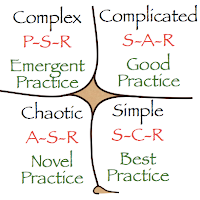Managing the Unknown
We've become experts at managing what we know. To achieve our goals, we break down the work and carefully measure our progress. We squeeze out efficient business practices and powerful system architecture through rigorous planning, testing and execution. But it's not good enough. Are we not often blindsided by the unforeseen? And isn't it true that most of the really valuable discoveries seem to be things we inadvertently trip over, almost by happenstance?
Managing Complexity
 Rather than relegating these circumstances to luck or fate, complexity science offers us some insights into how to manage the unknown. This is the premise of the recent HBR article published by Dave Snowden and Mary Boone, entitled "A Leader's Framework for Decision Making". The authors suggest that by identifying the context of a business situation, leaders can consciously choose an appropriate management approach:
Rather than relegating these circumstances to luck or fate, complexity science offers us some insights into how to manage the unknown. This is the premise of the recent HBR article published by Dave Snowden and Mary Boone, entitled "A Leader's Framework for Decision Making". The authors suggest that by identifying the context of a business situation, leaders can consciously choose an appropriate management approach:
Bottom Line
Evaluate your business challenges relevant to its complexity. Are you applying the appropriate management disciplines in each situation? We'll take a further look at some emergent practices for handling complexity in upcoming articles...
Managing Complexity
 Rather than relegating these circumstances to luck or fate, complexity science offers us some insights into how to manage the unknown. This is the premise of the recent HBR article published by Dave Snowden and Mary Boone, entitled "A Leader's Framework for Decision Making". The authors suggest that by identifying the context of a business situation, leaders can consciously choose an appropriate management approach:
Rather than relegating these circumstances to luck or fate, complexity science offers us some insights into how to manage the unknown. This is the premise of the recent HBR article published by Dave Snowden and Mary Boone, entitled "A Leader's Framework for Decision Making". The authors suggest that by identifying the context of a business situation, leaders can consciously choose an appropriate management approach:Don't have access the HBR article? Read this review by John Caddell or the original white paper published in the IBM Systems Journal.graphic and descriptions from the Cynefin article on Wikipedia
- Simple, in which the relationship between cause and effect is obvious to all, the approach is to Sense - Categorise - Respond and we can apply best practice.
- Complicated, in which the relationship between cause and effect requires analysis or some other form of investigation and/or the application of expert knowledge, the approach is to Sense - Analyze - Respond and we can apply good practice.
- Complex, in which the relationship between cause and effect can only be perceived in retrospect, but not in advance, the approach is to Probe - Sense - Respond and we can sense emergent practice.
- Chaotic, in which there is no relationship between cause and effect at systems level, the approach is to Act - Sense - Respond and we can discover novel practice.
Bottom Line
Evaluate your business challenges relevant to its complexity. Are you applying the appropriate management disciplines in each situation? We'll take a further look at some emergent practices for handling complexity in upcoming articles...

Comments